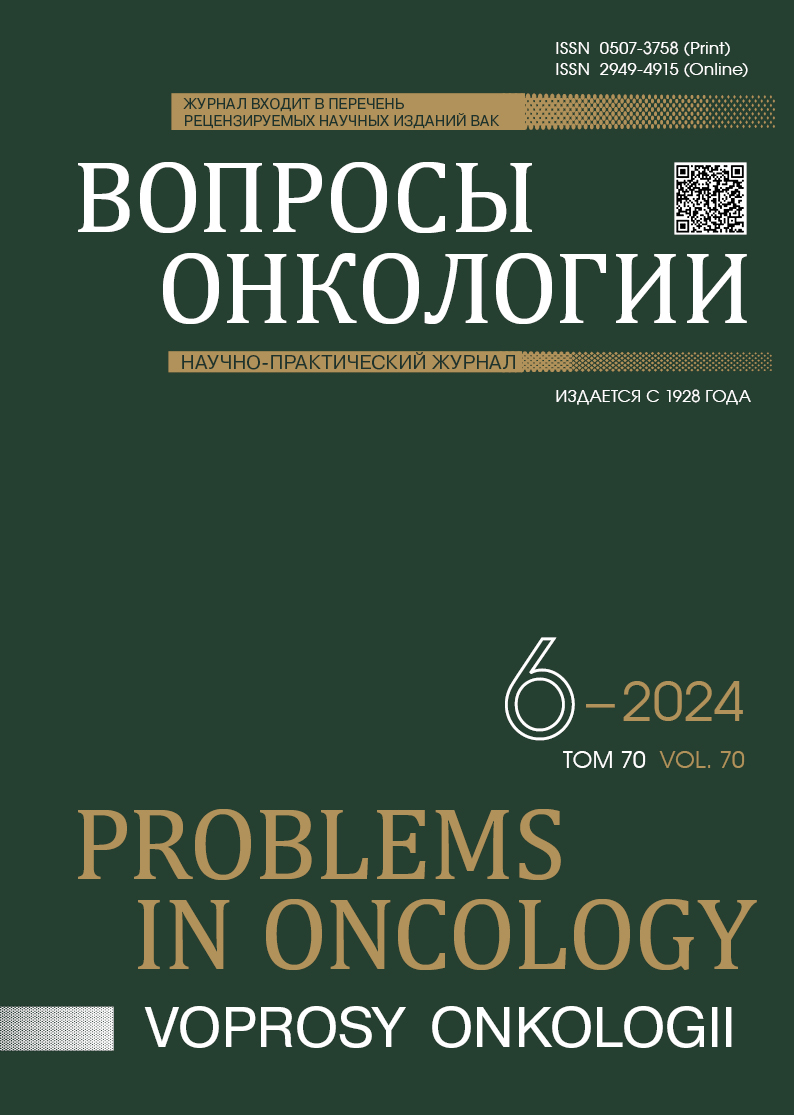Abstract
Introduction. The new staging system for endometrial cancer proposed by FIGO in 2023 focuses on the inclusion of molecular genetic classifications. Surgery based on the molecular genetic subtype of the tumor is still relevant.
Materials and Methods. The study was conducted at the Botkin Hospital in 2023, from June to December. The observation group, consisting of 50 patients, endometrioid endometrial cancer of clinical stage I, who underwent immunohistochemical examination for the presence of p53abn and MMRd at the preoperative stage. All patients were divided into 3 subgroups: patients with MMRd+ tumors, with p53abn+ tumors, and with negative tests for MMRd and p53abn. Laparoscopic surgical intervention scopes included hysterectomy with ovaries, hysterectomy with ovaries and sentinel lymph node biopsy with ICG mapping, in case of unsuccessful indocyanine staining in the intermediate and high-risk groups, pelvic lymphadissection on the corresponding side, hysterectomy with ovaries and pelvic lymphadenectomy, hysterectomy with ovaries, pelvic and lumbar lymphadenectomy were performed. TNM 8th revision 2017, FIGO 2009, and 2023 classifications were used to stage patients. After the results of the histological examination were obtained, the correlation of lymph node involvement was analyzed, taking into account the stage of the disease according to FIGO 2009 and FIGO 2023 and the molecular genetic subtype of the tumor.
Results. The incidence of patients with the MMRd/p53abn negative subtype was 74 %, patients with the p53abn mutant type of expression — 8 %, the MMRd group was identified in 18 % of cases. For the molecular genetic subtype MMRd, the frequency of lymph node metastasis increased to 22.2 %, and for p53abn it increased up to 25 %.
Conclusion. At present, there is insufficient data to formulate new surgical approaches based on the new classification. Nevertheless, it seems reasonable to increase the volume of surgery in patients with p53abn, and surgical lymph node staging should be mandatory in patients with MMRd.
References
Gu B., Shang X., Yan M., et al. Variations in incidence and mortality rates of endometrial cancer at the global, regional, and national levels, 1990-2019. Gynecol Oncol. 2021; 161: 573-580.-DOI: https://doi.org/10.1016/j.ygyno.2021.01.036.
Gilks C.B., Oliva E., Soslow R.A. Poor interobserver reproducibility in the diagnosis of high-grade endometrial carcinoma. Am J Surg Pathol. 2013; 37: 874-881.-DOI: https://doi.org/10.1097/PAS.0b013e31827f576a.
Thomas S., Hussein Y., Bandyopadhyay S., et al. Interobserver variability in the diagnosis of uterine high-grade endometrioid carcinoma. Arch Pathol Lab Med. 2016; 140: 836-843.-DOI: https://doi.org/10.1097/PAS.0b013e31827f576a.
de Boer S.M., Wortman B.G., Bosse T., et al. Clinical consequences of upfront pathology review in the randomised PORTEC-3 trial for high-risk endometrial cancer. Ann Oncol. 2018; 29: 424-430.-DOI: https://doi.org/10.1093/annonc/mdx753.
Jamieson A., Huvila J., Thompson E.F., et al. Variation in practice in endometrial cancer and potential for improved care and equity through molecular classification. Gynecol Oncol. 2022; 165: 201-214.-DOI: https://doi.org/10.1016/j.ygyno.2022.02.001.
Bernardini M.Q., Gien L.T., Lau S., et al. Treatment related outcomes in high-risk endometrial carcinoma: Canadian high risk endometrial cancer consortium (CHREC). Gynecol Oncol. 2016; 141: 148-154.-DOI: https://doi.org/10.1016/j.ygyno.2016.02.002.
Kandoth C., Schultz N., Cherniack A.D., et al. Integrated genomic characterization of endometrial carcinoma. Nature. 2013; 497: 67-73.-DOI: https://doi.org/10.1038/nature12113.
Talhouk A., McConechy M.K., Leung S., et al. A clinically applicable molecular-based classification for endometrial cancers. Br J Cancer. 2015; 113: 299-310.-DOI: https://doi.org/10.1038/bjc.2015.190.
Talhouk A., McConechy M.K., Leung S., et al. Confirmation of ProMisE: a simple, genomics-based clinical classifier for endometrial cancer. Cancer. 2017; 123: 802-813.-DOI: https://doi.org/10.1002/cncr.30496.
Kommoss S., McConechy M.K., Kommoss F., et al. Final validation of the ProMisE molecular classifier for endometrial carcinoma in a large population-based case series. Ann Oncol. 2018; 29: 1180-1188.-DOI: https://doi.org/10.1093/annonc/mdy058.
Stelloo E., Nout R.A., Osse E.M., et al. Improved risk assessment by integrating molecular and clinicopathological factors in early-stage endometrial cancer-combined analysis of the PORTEC cohorts. Clin Cancer Res. 2016; 22(16): 4215-24.-DOI: https://doi.org/10.1158/1078-0432.CCR-15-2878.
Stelloo E., Bosse T., Nout R.A., et al. Refining prognosis and identifying targetable pathways for high-risk endometrial cancer; a TransPORTEC initiative. Mod Pathol. 2015; 28: 836-844.-DOI: https://doi.org/10.1038/modpathol.2015.43.
Höhn A.K., Brambs C.E., Hiller G.G.R., et al. 2020 WHO classification of female genital tumors. Geburtshilfe und Frauenheilkunde. 2021; 81(10): 1145-53.-DOI: https://doi.org/10.1055/a-1545-4279.
Abu-Rustum N., Yashar C., Arend R., et al. Uterine neoplasms, version 1.2023, NCCN clinical practice guidelines in oncology. JNCCN. 2023; 21(2): 181-209.-DOI: https://doi.org/10.6004/jnccn.2023.0006.
Concin N., Matias-Guiu X., Vergote I., et al. ESGO/ESTRO/ESP guidelines for the management of patients with endometrial carcinoma. Int J Gynecol Cancer. 2021; 31: 12-39.-DOI: https://doi.org/10.1136/ijgc-2020-002230.
Benichou J., Schwall C., Sastre-Garau X., et al. Impact of the new molecular classification of endometrial cancer: A French cohort study. Gynecol Oncol. 2022; 166(3): 515-21.-DOI: https://doi.org/10.1016/j.ygyno.2022.07.012.
Post C.C.B., Stelloo E., Smit V.T., et al. Prevalence and prognosis of Lynch syndrome and sporadic mismatch repair deficiency in endometrial cancer. J Natl Cancer Inst. 2021; 113: 1212-1220.-DOI: https://doi.org/10.1093/jnci/djab029.
Borden L., Dvorak J., Barrett Z., et al. MLH1 hypermethylation predicts poor outcomes with pembrolizumab in recurrent endometrial cancer. Gynecol Oncol. 2022; 166(Suppl 1): Abstract 087.-DOI: https://doi.org/10.1016/S0090-8258(22)01312-9.
Jamieson A., Thompson E.F., Huvila J., et al. Endometrial carcinoma molecular subtype correlates with the presence of lymph node metastases. Gynecol Oncol. 2022; 165: 376-384.-DOI: https://doi.org/10.1016/j.ygyno.2022.01.025.
Momeni-Boroujeni A., Dahoud W., Vanderbilt C.M., et al. Clinicopathologic and genomic analysis of TP53-mutated endometrial carcinomas. Clin Cancer Res. 2021; 27: 2613-2623.-DOI: https://doi.org/10.1158/1078-0432.CCR-20-4436.
Гавриш Ю.Е., Артемьева А.С., Сидорук А.А., et al. Молекулярная субклассификация карцином тела матки: возрастные аспекты. Профилактическая и клиническая медицина. 2023; (2): 41-54.-DOI: https://doi.org/10.47843/2074-9120_2023_2_41. [Gavrish Yu.E., Artemieva A.S., Sidoruk A.A., et al. Molecular subclassification of endometrial cancer: age aspects. Preventive and Clinical Medicine. 2023; (2): 41-54.-DOI: https://doi.org/10.47843/2074-9120_2023_2_41. (In Rus)].
Petousis S., Christidis P., Margioula-Siarkou C., et al. Combined pelvic and para-aortic is superior to only pelvic lymphadenectomy in intermediate and high-risk endometrial cancer: a systematic review and meta-analysis. Arch Gynecol Obstet. 2020; 302(1): 249-263.-DOI: https://doi.org/10.1007/s00404-020-05587-2.

This work is licensed under a Creative Commons Attribution-NonCommercial-NoDerivatives 4.0 International License.
© АННМО «Вопросы онкологии», Copyright (c) 2024

